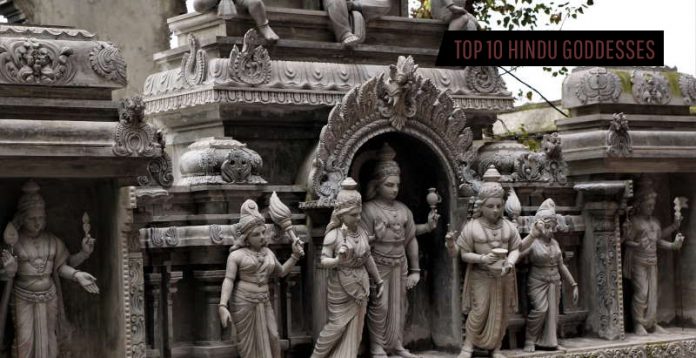Hinduism has male and female gods representing the supreme power of the universe, and all the major gods have male and female counterparts. Goddesses are a representation of Shakti, the source of the female power of the universe. They are highly regarded and powerful and play a central role in creating, protecting, and destroying the universe. This is a list of 10 Hindu goddesses who source this power:
10.Radha
Radha is almost always portrayed alongside Krishna. It is also known as Radhika or Radharani. Radha and Krishna are thought to be incomplete without each other, and Radha is Krishna’s companion and friend, representing his divine power and the Shakti. Radha is considered superior to Rukmini (wife of Krishna and incarnation of goddess Lakshmi) and not the incarnation of Lakshmi (consort of Vishnu) itself. Radha is known for his tremendous devotion towards Krishna, which reflects each devotee’s longing to be united with the supreme. Through the power of her devotion, she attained the status of a goddess and was worshiped by a large number of devils.
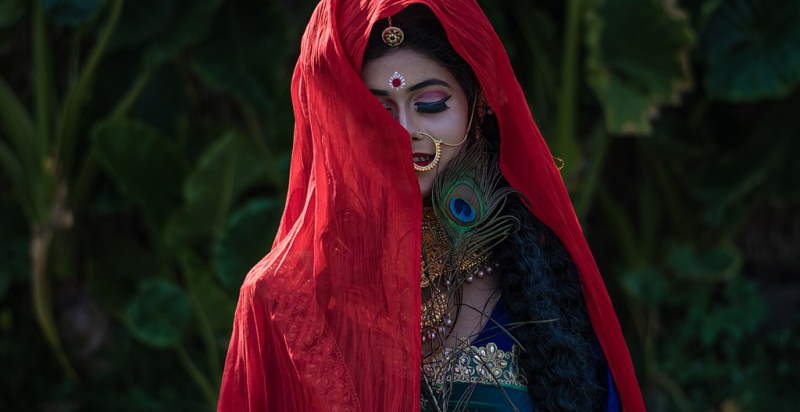
9. Kamadhenu
Kamadhenu, as being the mother of all cows and the goddess of abundance. She can fulfill the deepest desires of her devotees. Her iconography describes her as a cow with a woman’s head and breasts or as a cow with various deities inside it. Kamadhenu emerged in the great mantra Samudra’s process, the churning and mixing of the great oceans by the gods’ Asuras and Devas. Cows are the divine figure in Hinduism because of the goddess Kamadhenu. Every part of Kamadhenu’s body has symbolic importance. For example, its four legs represent the four Vedas, the horns symbolize the gods, and the mounds stand for the Himalayas.
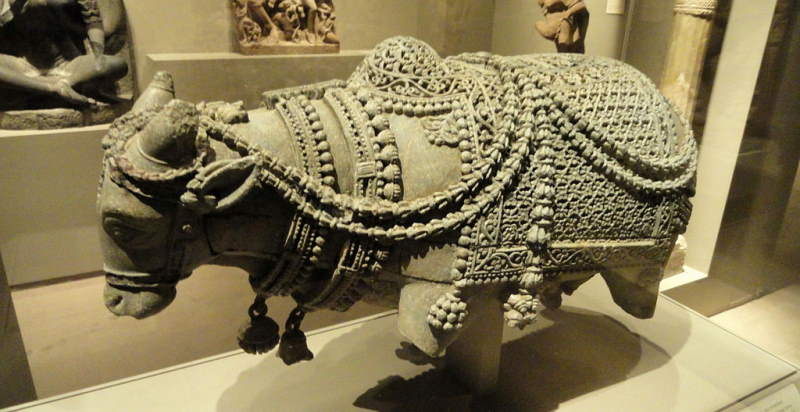
8. Tulsi
Tulsi is a Hindu goddess and worshiped in the form of basil plants. This herb has medicinal and mythical importance in Hinduism. Tulsi’s story is often associated with Vrinda and Jalandhar. Jalandhar was born from the third eye of Lord Shiva. He(Jalandhar) became so mighty and threatened the existence of the gods. His power was also the result of Vrinda’s dedication and loyalty, who was an avid believer in Vishnu. Vishnu decided to kill Jalandhar and save the world and the gods. He took the form of Jalandhar and decided to approach Vrinda, which led to her unfaithfulness. After getting the truth that Vishnu was in the face of her husband, She(Vrinda) eventually threw herself into her crematorium and was reborn as Tulsi.

7. Ganga
Ganga is the embodiment of the Ganga River. It is a popular goddess in Hindu myth and Parvat Raj Himalaya’s daughter, also known as Himavan, and the goddess Parvati’s sister. She returned to Earth to wash away human sins at the request of Shiva and withstand falling water from the sky. The Ganga River flows through the Himalayas and down to the plains of India.
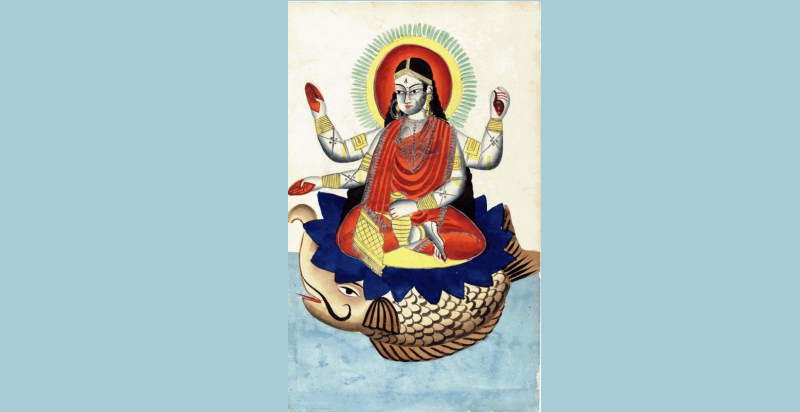
6. Sita
Sita, also known as Janaki, is a Lakshmi incarnation. She is the daughter of King Janak, and her name comes from her birthplace, Janaki Mandir, located in Janakpur in Nepal and dedicated to Sita. She is considered to have evolved from Bhumi and is also the daughter of Mother Earth. This is Ram’s consort, and he is a leading figure in the epic Ramayana. Sita lived and supported Ram in his 14-year exile from Ayodhya when captured by the demon king of Lanka, named Ravana. This act leads to the fight where Ram kills Ravana and rescues Sita. She is also renowned and revered for the Agni Parikchya, piloted by fire that she is still on Ram’s orders to prove her innocence. Sita is the representation of female power and virtue.
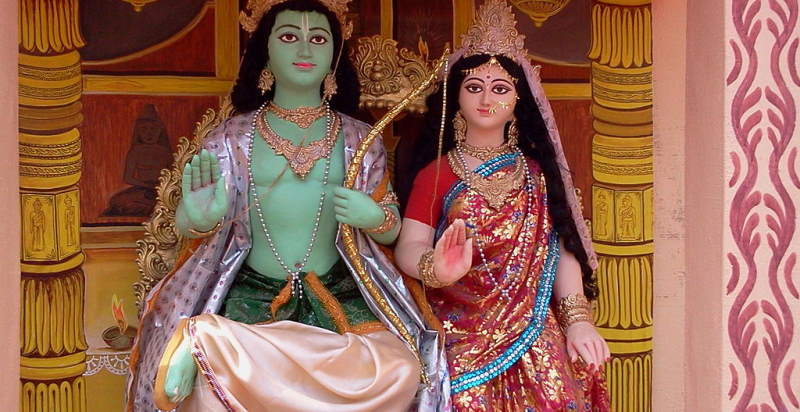
5. Kali
Kali is a fierce expression of Shakti, also known as a destroyer or a person who frees souls to provide moksha or enlightenment and was born to defeat the demon Raktabeech, believed to be the incarnation of Parvati/Durga. From a drop of blood that touched the ground, she created a new and powerful demon, so Kali is considered a fierce and angry goddess with a skull wreath, sword, and bowl in her hand. During the battle, she had to cut the Raktabeej. , Filling her bowl with his blood and drinking it, she continued to do so and, as a result, became aggressive and destructive. To protect the world from her anger, her husband, Shiva, lied down under her feet to calm her down. Realizing her mistake, she bit her tongue in embarrassment, and her iconography shows Lord Shiva lying under her feet.
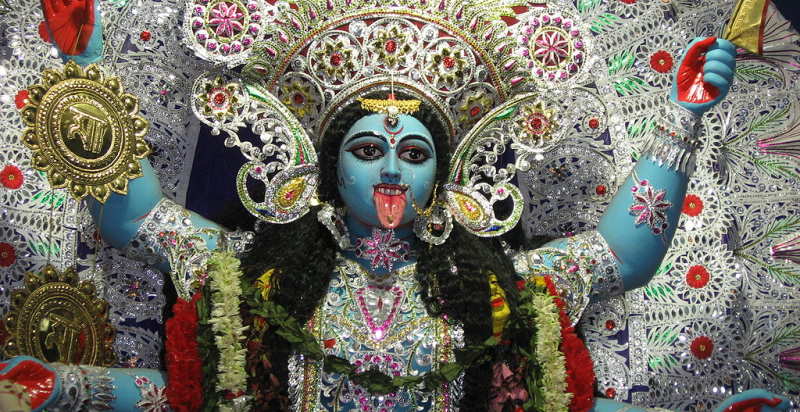
4.Saraswati
She is the goddess of knowledge, art, music, and learning, also known as Sharada, the wife of Brahma. Saraswati is one of the goddesses of Hindu Tridevi, the feminine counterpart of Tridevs, sat on a swan or goose as her vahana. Her iconography shows her with her four hands, two of which are holding her instrument, veena. Saraswati Puja is observed on the first day of spring, the day of Basant Panchami. We salute and wish you a blessing of wisdom and knowledge at her temple early in the morning.
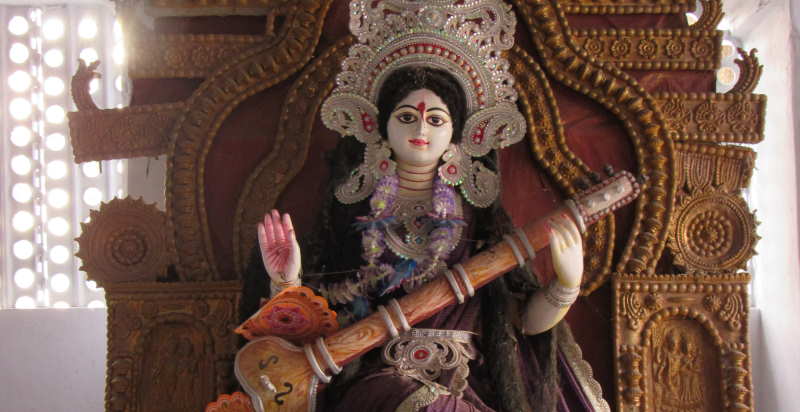
3. Lakshmi
Lakshmi is the famous goddess in Hindu mythology, representing wealth, fertility, and abundance. During the festival of Deepawali, which is being considered the festival of light and the biggest festival in North India, she is the one who worshipped a lot, and her devotees pray to her to choose their home and enlighten it with happiness and prosperity. Owl and Airawat, named of a white elephant, are the most popular vahana of Goddess Lakshmi.

2. Parvati
Parvati is one of the goddesses of Tridevi, also known as Gauri. She is Shiva’s wife and mother of Kumar and Ganesha. Once the wife of Shiva, Parvati is the reincarnation of Satie, who was thrown into the fire for insulting behavior against her father’s husband. Parvati was born as a mortal in the Parvati Large Himalayas. Through her constant penance and dedication, she gained Shakti’s full power, became one of the most respected goddesses, and became Shiva’s legitimate wife. Parvati is a caring person. Her Bahamas are lions or tigers.
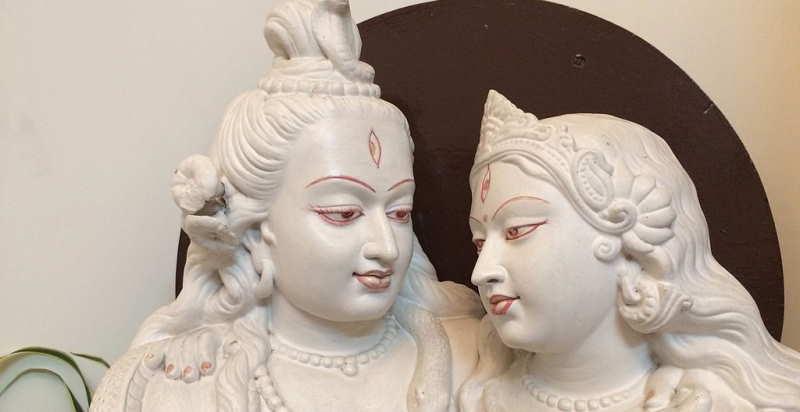
1. Durga
Durga is probably one of Shakti’s most famous symptoms. One of the principal deities worshiped during Dashain / Navaratri’s festival, one of the essential Hindus festival. The festival also celebrates the death of Mahisa Sur, one of the most powerful demon gods. Mahisa Sur became famous for being killed by the goddess Durga, who believed that the goddess could not be a goddess powerful enough to kill him. Her iconography shows her riding on a lion and holding tissue or trident, accompanied by the body of MahisaSur, depicted with multiple hands and stabbed by her “Trisule.”

Conclusion
Hindu goddesses are the divine expression complementary to the male. Both the male and female gods complete the universe’s theology. The female goddess is the supreme divine, with each goddess representing Shakti and a part of the universe. Still, there exist many other beliefs based on philosophy and ideology in Hindu mythology.
